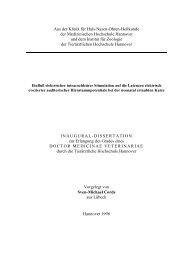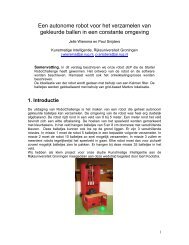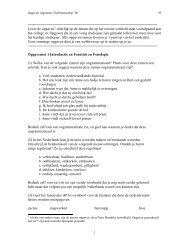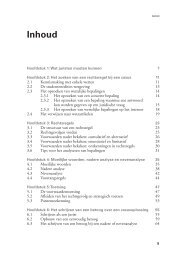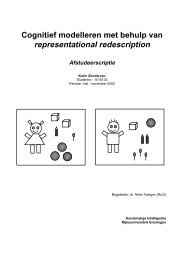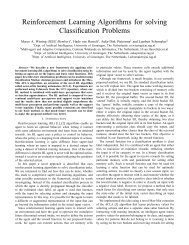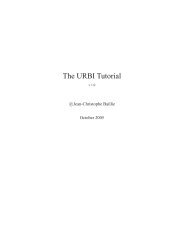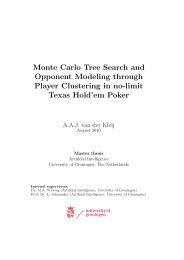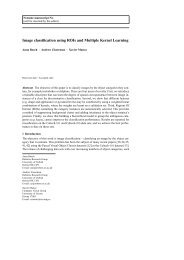Presuppositions in Spoken Discourse
Presuppositions in Spoken Discourse
Presuppositions in Spoken Discourse
Create successful ePaper yourself
Turn your PDF publications into a flip-book with our unique Google optimized e-Paper software.
Chapter 5<br />
def<strong>in</strong>ite NP the woman. Another simplification is the claim that pronouns never<br />
accommodate. There are situations where a pronoun can be used felicitously<br />
without a discourse-given antecedent. Consider the follow<strong>in</strong>g examples ((21) taken<br />
from Geurts 1999, ex 67).<br />
(21) The doctor kept warn<strong>in</strong>g him but he would never listen, and now Harry’s<br />
dead.<br />
(22) Grandma refused to accept it, so I put the money <strong>in</strong> her purse.<br />
For both examples the pronouns must be accommodated at the time that the<br />
pronoun is reached, an example of cataphora or forward reference. We obta<strong>in</strong><br />
enough descriptive <strong>in</strong>formation to fully understand the reference later, and this<br />
makes the entire utterance felicitous. Thus it seems that the <strong>in</strong>terpretation of some<br />
pronouns can <strong>in</strong>volve accommodation <strong>in</strong> their resolution at some po<strong>in</strong>t, though<br />
this is a less frequent use of pronouns.<br />
<strong>Presuppositions</strong> and pronouns differ <strong>in</strong> that a presuppositional expression<br />
generally signals the semantic type of its referent by its trigger. The semantic type<br />
of the presuppositions of factives and aspectual verbs are pre-determ<strong>in</strong>ed. In this<br />
way this or that are semantically poorer because you cannot tell from this whether<br />
you are deal<strong>in</strong>g with an abstract object or with a concrete one. But from she or they<br />
you can determ<strong>in</strong>e semantic type even though they are pronouns and from this<br />
situation or the woman, you can determ<strong>in</strong>e semantic type, even though they conta<strong>in</strong><br />
relatively little descriptive <strong>in</strong>formation.<br />
Still, pronouns <strong>in</strong> general have less descriptive content than most<br />
presuppositions triggers, and this seems to give us an explanation of why pronouns<br />
do not accommodate well.<br />
If we now consider the non-accommodat<strong>in</strong>g triggers, tak<strong>in</strong>g too as our<br />
representative, Zeevat (to appear) has argued that van der Sandt’s explanation fails<br />
<strong>in</strong> that it doesn’t offer a plausible account for why too doesn‘t accommodate.<br />
Follow<strong>in</strong>g van der Sandt & Geurts (2001), too φ(a) is treated as presuppos<strong>in</strong>g<br />
another predicate of the same type as that <strong>in</strong> the utterance with too, (e.g. the theme,<br />
or φ <strong>in</strong> the DRS representation), but with a different contrasted element (e.g. the<br />
focus element or x), that may not be identical to the element <strong>in</strong> the utterance with too<br />
(e.g. a). The form of the presupposition <strong>in</strong> its alpha-structure is then α[ : φ(x), α[ x :<br />
x ≠ a ]], where [ x : x ≠ a ] is a pronom<strong>in</strong>al element. The presuppositional<br />
expression would seem to have a great deal of descriptive <strong>in</strong>formation, yet the<br />
presupposition triggered by too is generally difficult to accommodate and the trigger<br />
isn’t used this way <strong>in</strong> the corpus either. This is not accounted for <strong>in</strong> van der Sandt’s<br />
explanation.<br />
F<strong>in</strong>ally, van der Sandt can expla<strong>in</strong> why presuppositions <strong>in</strong>duced by triggers <strong>in</strong><br />
the accommodat<strong>in</strong>g group can be used felicitously without an antecedent. Factives<br />
<strong>in</strong>duce presuppositions derived from the lexical <strong>in</strong>formation <strong>in</strong> their complements<br />
and this is generally a great deal of descriptive content.<br />
120



